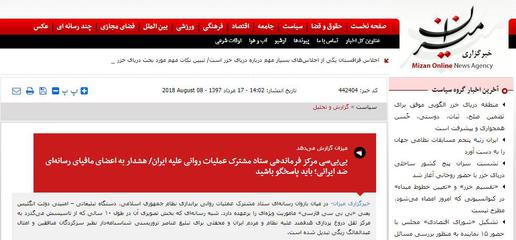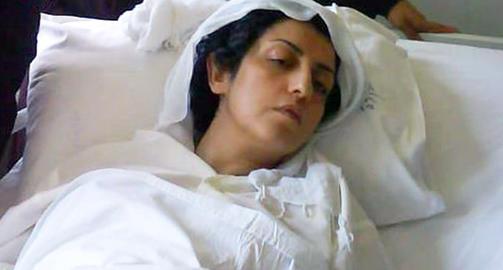Mizan News Agency, run by Iran’s judiciary, has warned BBC Persian journalists that "they will get what they deserve" for being "divisive," "misrepresenting history" and spreading propaganda.
The outlet published further information on charges against BBC Persian journalists and other staff on August 8, and stated that the accused face charges of engaging in “propaganda for the leaders of Jondollah, a terrorist group,” and organizing riots in Iran.
The article mentions several BBC journalists by name, including Hossein Bastani, Kasra Naji, Zhiar Gol, Negin Shir-Aghayi, and Siavash Ardalan, citing their reporting as evidence that the journalists are carrying out the BBC’s political and security missions in Iran.
In one example, the Mizan article points to Bastani’s documentary on the Iran-Iraq war, saying he had been given the mission of “misrepresenting history of the war.” It says that Gol’s mission had been to write a “divisive report” in order to promote “separatism” among Iranian Kurds, and that Negin Shir-Aghayi had been tasked with promoting homosexuality through covering an LGBT pride parade.
The author also warns BBC employees that “they will get what they deserve” and states that Iran’s judiciary has plans to start a new wave of persecutions against these journalists.
Inciting Violence
Responding to the accusations, Francesca Unsworth, the BBC’s Director of News and Current Affairs, said: “These latest comments from the Iranian news agency connected to the judiciary in Iran represent a significant escalation of the threats made against named BBC Persian staff. In deliberately inflammatory language, this statement effectively incites violence against our journalists. We call once again for all Iranian harassment against BBC Persian staff and their families in Iran to end immediately. This is an issue of press freedom, and of the rights of all journalists around the world to operate without fear of violence or persecution.”
But how serious are the threats and do the journalists have any way of defending themselves? “Although some of the accusations attributed to these journalists are merely personal opinions and interpretations, there are still some examples that, even according to Iranian law, can be considered as a crime and the journalists can file a lawsuit against the news agency,” said Musa Barzin-Khalifeloo, legal advisor to IranWire. “For example, the accusation of ‘supporting terrorist groups’ is a serious charge and the news agency’s managers and editors can be held accountable in the court for accusing people of such a horrendous and serious charge.”
The Culture and Media Court of Tehran was established in 2010 to prosecute media crimes. The court is located at 15th Khordad Square in the central building of Tehran’s Common and Revolutionary Court.
Prior to the publication of the most recent report, some of the targeted BBC Persian staff hired a lawyer in Iran to follow up on their cases. According to Barzin, this lawyer will be able to file a lawsuit against Mizan News Agency with the Culture and Media Court of Tehran.
The Article 6 of the Media and Press Code of the Islamic Republic of Iran states: “Distribution and publication of rumors or dissemination of false information or distortion of others’ contents is forbidden and considered a crime.” According to the law, the punishment of such crimes is clarified in Article 698 of the Islamic Criminal Code, which states that “imprisonment from two months to two years and 74 lashes” can result in such cases.
Barzin also pointed out that BBC Persian managers have the right to issue an official statement for publication on Mizan’s website. “According to the Media and Press Code, the news agency is required to publish the official response of BBC Persian in their own outlet.”
On the other hand, persecutions against BBC Persian staff have escalated since 2017, when the Iranian government imposed sanctions on 152 BBC employees in Iran. Iran’s judiciary is behind the sanctions, as are law enforcement agencies including the ministry of intelligence.
Interrogations and Intimidation
Three relatives of BBC Persian staff who reside in the country and therefore asked for their identities to remain undisclosed told IranWire that even former employees of BBC Persian have been placed on the judiciary’s blacklist for sanctions. “During the last year, some of the former employees of BBC who are not working with this network anymore came back to the country to visit their family and friends, but their passports were seized at the airport and they have been summoned to the office of the ministry of intelligence in Tehran for questioning,” the relatives said.
“These interrogation sessions usually happen in multiple settings and in some cases last for 10 hours. During the interrogation, the former employees were asked to list the names of all BBC staff and describe their relationship with them. In some cases, they even have been asked to write down, separately for each of the staff, details about their personal lives, interests, meetings, romantic and sexual relationships, etc.”
IranWire asked the relatives about the atmosphere and conditions of these interrogations, and they said: “The interrogations take place in a respectful yet intimidating environment. If former employees of BBC Persian can prove they have resigned and provide them with the sufficient documents, their names will be removed from the sanctions blacklist. They can go back to their normal life as ordinary citizens and can even leave and come back to the country. But if they can’t prove the resignation or fail to provide enough documents, even though they don’t really work for the BBC anymore, not only will their names remain on the sanctions list, but also they will be given a travel ban and barred from leaving the country.”
With respect to these persecutions, legal advisor Musa Barzin-Khalifeloo said: “According to the Islamic Criminal Code of the Islamic Republic of Iran, even if the judiciary believes the journalists have committed any crimes, it has no legitimacy or authority to prosecute their families and friends. They can only go after the suspects themselves.”
Article 141 of the Islamic Criminal Code states: “Every individual is only responsible for [his or her] own actions and no one else shall be held accountable for the wrongdoings of someone else.”
According to Barzin, the detainment and interrogations of the former employees of BBC Persian to produce evidence and testimonies against current staff are also unlawful. Since the detainment and interrogation of these individuals have been executed by the ministry of intelligence, filing a lawsuit against them in the military court could lead to the criminal prosecution of ministry officials. The military court is located in Shariati Street in Tehran and its phone number is +9882909. The head of the court is Shokrollah Bahrami and Gholam-Abbas Turki serves as Tehran’s military prosecutor in the court.
“According to a law that was passed in the early days after the revolution, imposing sanctions on people requires first the proof of their guilt in the court and second, the proof that those individuals acquired their income and wealth through illegal activities. This is the law that, after the revolution, allowed the confiscation of the properties of many individuals who were allegedly affiliated with the former regime,” Barzin said.
Barzin also cited principle 49 of the Iranian constitution, which outlines the conditions of imposing sanctions on citizens. The principle specifies that respect must be shown for personal property and frankly clarifies that citizens’ properties and wealth are immune from any state intervention or invasion. But it also specifies the exceptions to this, and outlines what individuals’ properties can be subject to government scrutiny and invasion. “The government shall seize all the income and wealth generated from usury, bribery, usurpation, embezzlement, theft, gambling, misusing power or position, selling public land or property, establishing unlawful centers, etc, and seek to return the seized property to its true owners. If the owner is not identifiable or out of reach, the seized properties belong to the public treasury. The execution of this verdict is carried out by the government and they need to fully investigate, research, and prove the wrongdoings before taking any actions.”
Regulations passed on how to execute the 49th principle of the constitution also clarify that the majority of these conditions refer exclusively to the former regime’s affiliates or people who are engaged in illegal activities, and no one else.
The Iranian judiciary charged BBC journalists with conspiracy against national security. But, according to Barzin, the charge does not actually exist in the Islamic Criminal Code. “We only have ‘crimes against national security’ in the Islamic Criminal Code, which recognizes a limited number of charges, including espionage, as an example for this category. Therefore, all the convictions and prosecutions under the charge of ‘conspiracy against national security’ are merely political interpretations of the law and unlawful.”
The Judges Supreme Court investigates and prosecutes unlawful activities and unjust verdicts by judges. If a court does not follow the law at each step of the process, an individual can file a lawsuit in this court. The court is located at Imam Khomeini Square, Khayyam Street, in front of the judiciary building.
More on the targeting of BBC Persian journalists:
BBC Persian Appeal to the UN: "Journalism is Not a Crime"
Iran's Persistent Attack on BBC Persian Journalists
Iran Freezes the Assets of BBC Persian Staff
visit the accountability section
In this section of Iran Wire, you can contact the officials and launch your campaign for various problems

























comments